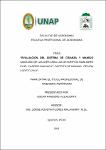| dc.contributor.advisor | Flores Malaverry, Jorge Agustín | |
| dc.contributor.author | Panduro Villacorta, Oscar | |
| dc.date.accessioned | 2021-07-26T10:49:18Z | |
| dc.date.available | 2021-07-26T10:49:18Z | |
| dc.date.issued | 2021 | |
| dc.identifier.uri | https://hdl.handle.net/20.500.12737/7382 | |
| dc.description.abstract | El estudio tanto sobre la evaluación del sistema de crianza y manejo sanitario de las
aves criollas de huertos familiares en el caserío Sinchicuy, distrito de Indiana, región
Loreto, cuyo objetivo general fue evaluar las condiciones de los sistemas de crianza
y manejo sanitario de aves criollas, así como, identificar las condiciones de crianza
de aves criollas y el manejo sanitario de la crianza de aves criollas en huertos
familiares del Caserío Sinchicuy, Distrito de Indiana. El Tipo y diseño de investigación
es descriptivo, cuantitativo, no experimental, prospectivo y transversal. Se usó el
muestreo probabilístico de forma aleatoria, donde se seleccionó la muestra de 41
productores de gallinas regionales. Los resultados de las encuestas fueron: el
sistema de producción encontrado es el extensivo, donde 49.78% posee gallinas
regionales, patos y gallina (39.02%), gallos (7.32%) y patos (4.88%), y tienen en
promedio más de 21 aves (60.98%). La finalidad de la producción: venta de aves
(60.98%) y consumo (19.51%), de las aves se obtienen carne, huevos y crías. Las
instalaciones agrícolas casi no existen, el alimento se deposita en el suelo (92.68%).
El alimento que prevalece son los residuos de cosecha y algunos sobrantes de la
comida familiar (78.05%) y al pastoreo se alimenta de gusanos e insectos del huerto.
el 9.75% utiliza maíz y arroz en grano además de yuca picada. el 2.45% suplementa
concentrados a sus aves (1 Kg). Se recogen mayoritariamente más de 12 huevos,
(60.98%). Se destinan semanalmente de 6 a 10 huevos para recría. La sanidad
animal está basada en el uso de plantas medicinales o medicinas químicas de uso
humano, no vacunan a las aves (87.80%) por no conocer los insumos (48,78%) y por
economía (29.27%) | es_PE |
| dc.description.abstract | The study on the evaluation of the breeding system and sanitary management of
creole birds from home gardens in the Sinchicuy hamlet, district of Indiana, Loreto
region, whose general objective was to evaluate the conditions of the breeding
systems and sanitary management of creole birds , as well as, identify the breeding
conditions of Creole birds and the sanitary management of the breeding of Creole
birds in family gardens of the Sinchicuy Village, District of Indiana. The type and
design of the research is descriptive, quantitative, non-experimental, prospective and
cross-sectional. Probability sampling was used randomly, where the sample of 41
regional chicken producers was selected. The results of the surveys were: the
production system found is extensive, where 49.78% have regional chickens, ducks
and hens (39.02%), roosters (7.32%) and ducks (4.88%), and have on average more
than 21 birds (60.98%). The purpose of the production: sale of birds (60.98%) and
consumption (19.51%), meat, eggs and young are obtained from the birds.
Agricultural facilities almost do not exist, food is deposited on the ground (92.68%).
The prevailing food is harvest residues and some leftovers from family food (78.05%)
and grazing feeds on worms and insects from the garden. 9.75% use corn and rice in
grain in addition to minced cassava. 2.45% supplement concentrates to their birds (1
Kg). Mostly more than 12 eggs are collected, (60.98%). From 6 to 10 eggs are
destined weekly for rearing. Animal health is based on the use of medicinal plants or
chemical medicines for human use, they do not vaccinate birds (87.80%) because
they do not know the inputs (48.78%) and due to economy (29.27%) | es_PE |
| dc.format | application/pdf | es_PE |
| dc.language.iso | spa | es_PE |
| dc.publisher | Universidad Nacional de la Amazonía Peruana | es_PE |
| dc.rights | info:eu-repo/semantics/openAccess | es_PE |
| dc.rights.uri | https://creativecommons.org/licenses/by/4.0/ | es_PE |
| dc.subject | Sistemas agrícolas | es_PE |
| dc.subject | Cría de aves de corral | es_PE |
| dc.subject | Sanidad animal | es_PE |
| dc.subject | Manejo | es_PE |
| dc.subject | Huertas familiares | es_PE |
| dc.title | Evaluación del sistema de crianza y manejo sanitario de las aves criollas de huertos familiares en el caserío Sinchicuy, distrito de Indiana. Región Loreto 2019 | es_PE |
| dc.type | info:eu-repo/semantics/bachelorThesis | es_PE |
| thesis.degree.discipline | Agronomía | es_PE |
| thesis.degree.grantor | Universidad Nacional de la Amazonía Peruana. Facultad de Agronomía | es_PE |
| thesis.degree.name | Ingeniero(a) Agrónomo | es_PE |
| dc.subject.ocde | http://purl.org/pe-repo/ocde/ford#4.02.02 | es_PE |
| renati.author.dni | 46470423 | |
| renati.advisor.orcid | https://orcid.org/0000-0002-1125-8600 | es_PE |
| renati.advisor.dni | 05203391 | |
| renati.type | http://purl.org/pe-repo/renati/type#tesis | es_PE |
| renati.discipline | 811036 | es_PE |
| renati.level | http://purl.org/pe-repo/renati/level#tituloProfesional | es_PE |
| renati.juror | Navarro Torres, Darvin | |
| renati.juror | Pinedo Jiménez, Julio | |
| renati.juror | Chávez Vásquez, Rafael | |
| dc.publisher.country | PE | es_PE |


